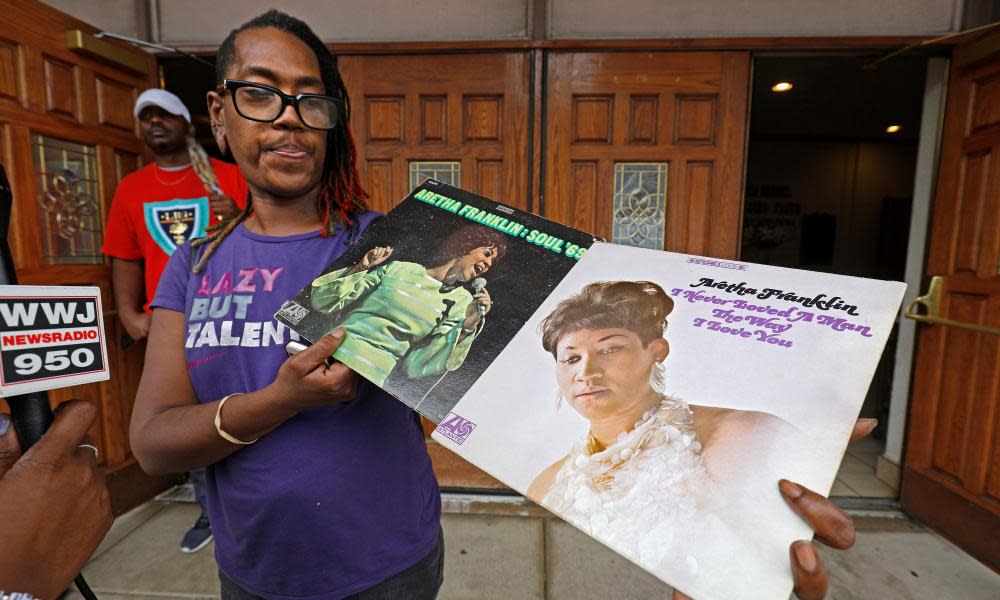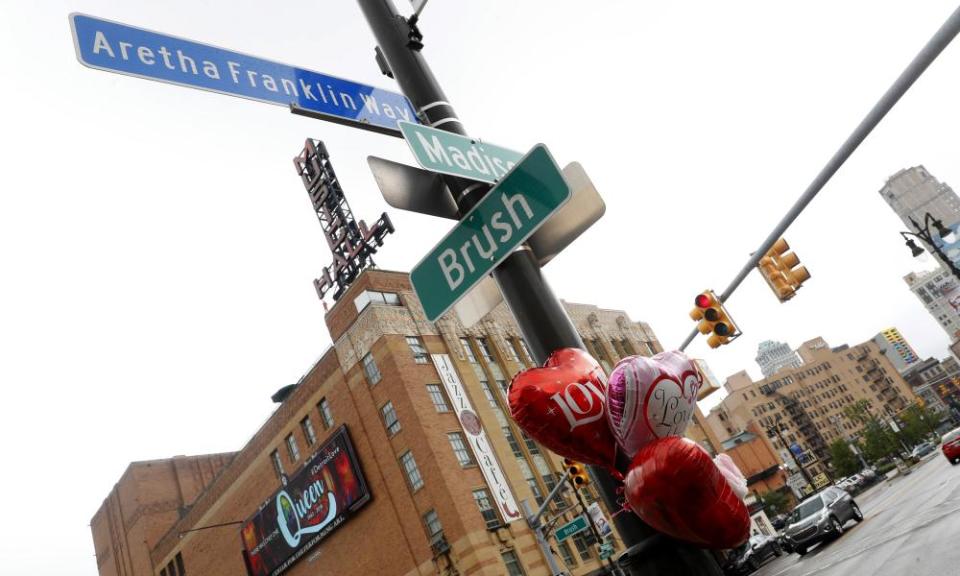Detroit plays Aretha Franklin's hits and remembers its hometown queen

Detroiters continue to celebrate Aretha Franklin, their homegrown ‘queen of soul’, with events, gatherings and tributes that show no signs of slowing down.
The singer died from pancreatic cancer on Thursday, at her home in the city. She was 76 years old. On Friday night, at landmarks like Cobo Hall and the Fox Theatre, marquees and billboards were lit up in her honor.
Details of Franklin’s funeral were confirmed by her publicist, Gwendolyn Quinn. Public viewings will be held on 28 and 29 August at the Charles H Wright Museum of African American History, which held Rosa Parks’ viewing in 2005. The ceremony will be held on 31 August, with a service for family and friends at Greater Grace Temple. Franklin will be buried in Woodlawn cemetery, which holds members of her family.
As the weekend drew on, Detroiters remembered a singer who changed the course of music but always embraced her often beleaguered hometown, when many others didn’t.
At the Music Hall Center for the Performing Arts, a digital display read: “Forever Our Queen of Soul, Aretha Franklin, 1942-2018.” Franklin’s final performance in the city was there, last year. At the Made in Detroit restaurant downtown, a newer star plastered a message on his marquee: “Sending lots of love and prayers for Aretha. All of my respect – Kid Rock.”
On Friday night, the museum held a tribute concert as part of its 36th annual African world festival, with performances by local musicians. Franklin’s longtime choreographer, Lisa McCall, and several dancers dressed in white and closed the night with a performance set to Franklin’s gospel classic, Mary Don’t You Weep.
“I need the skies to just hold off,” McCall said, as rainclouds gathered. “We are going to speak to you through our movements.”
A lot of people gain their stardom and there’s no connection back to where they grew up. It wasn’t like that with her
Njia Kai, African World Festival
The Museum has opened each day since Franklin’s death by playing her music. It will hold a gospel celebration on Sunday. For Njia Kai, director of the African world festival, Franklin was simply part of growing up in Detroit.
“We respected her talent and consciousness,” she said, “and how she kept it real – she maintained that while also bringing an understanding to the level of celebrity that she had acquired. A lot of people gain their stardom and there’s no connection back to their neighborhood or where they grew up. It wasn’t like that with her.”
The city’s professional sports teams also honored “Ree Ree”, as she was known locally. On Friday night, the Detroit Lions football team made an announcement before their preseason opener at Ford Field. The city and the world had “lost a true superstar”, it said. Franklin performed at Ford Field on Thanksgiving Day in 2016, singing The Star-Spangled Banner.
The Detroit Tigers baseball team were away in Minneapolis, but they walked on to the field to Franklin’s most well-known and loved hit: R-E-S-P-E-C-T.
‘Showing us how to be strong’
In the city’s North End, a display of flowers, teddy bears and balloons grew in the doorway of New Bethel Baptist church, which Franklin’s father led from 1946 to 1979. Aretha sang gospel there, her singing career and spiritual life beginning.
One note attached to a bouquet of red roses thanked Franklin for sharing her voice and “showing us how to be strong and persevere”.

Less than two miles away, mourners gathered where Berry Gordy founded the internationally beloved Motown record label in 1959. It is now the Motown Museum. In the broad pages of a guestbook left just outside the entrance, visitors from Massachusetts, Maryland, Florida, Virginia, Canada, Uganda and New Zealand had left their condolences and signed their names.
Detroit was the center of the 20th century in so many ways, and Aretha is a part of that
Carelton Gholz, Detroit Sound Conservancy
In a statement, Robin Terry, chairwoman and chief executive of Motown Museum, said: “While [Franklin] was never signed to the Motown label, there was no question she was part of the Motown family.” Franklin performed at the museum’s 20th anniversary gala; the museum pledged to play Franklin’s hits all weekend long.
Franklin did record at United Sound Systems (USS), which was planning to open on Sunday for the public to walk through, listen to her music and look at evocative photos. “We’re welcoming whoever shows up,” a representative said.
Established in 1939, USS was one of Detroit’s first independent recording studios. In 1985, Franklin worked there with the Eurythmics and the Rolling Stones.
Carleton Gholz, founder of the Detroit Sound Conservancy, which helped get a historical marker for the studio, sent a bouquet.
“It’s an important, secular place to honor Aretha,” he said. “Detroit was the center of the 20th century in so many ways, and Aretha is a part of that. It’s very affirming that we were the place she came back to.”
In south-west Detroit at the El Club, an all-ages arts venue, patrons celebrated Franklin’s life with Chicago DJ WhoDat and Brad Hales, proprietor of Detroit-based Peoples Records. El Club founder Graeme Flegenheimer organized the evening and would donate all proceeds to MusiCares, a foundation for musicians experiencing financial, personal or medical crisis, including drug rehabilitation.
“She was one of the few artists that hadn’t left Detroit,” said Flegenheimer, adding that he was a recovering addict and had friends who received direct assistance from MusiCares. “I think when people pass away who have had such a significant impact on people’s lives, you have to pay your respects. And I wanted to do right by her.”
As midnight loomed, commemorations and celebrations were still going strong. PedalUp Riderz, a cycling group, organized a “Friday Night Groove”. Dozens of riders made stops at the museum, the Baptist church and the house in which Franklin grew up, on the west side.
They blasted unforgettable hits such as You Make Me Feel (Like a Natural Woman) and stopped to hear each other speak. “Thank you queen, for your sacrifices,” one rider said. “Thank you for your love.”

 Yahoo News
Yahoo News 
